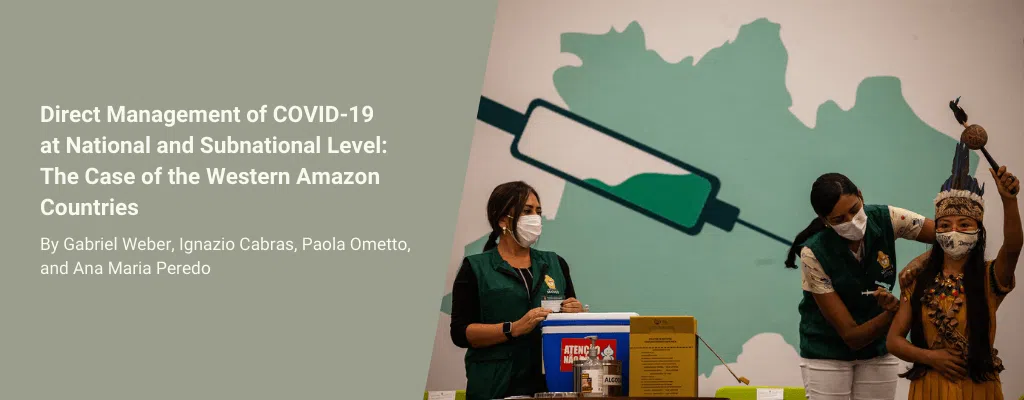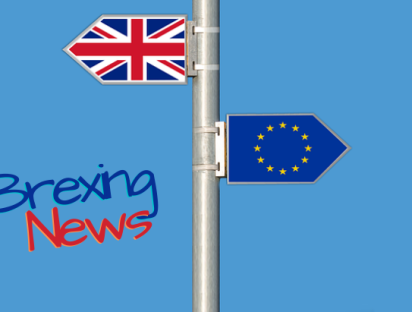In their study, the authors analyse the impact of public management of COVID-19 in the Western Amazon region; Brazil, Colombia, and Peru, three countries with the highest per capita rate of Covid cases.
This case study presents the response of the governments of these countries to the pandemic at national and subnational levels, and also the reasons why this Amazon region has been the most affected by COVID-19.
In Brazil, with 0.4% of the population identified as indigenous (International Working Group on for Indigenous Affairs, 2021) no anti-Covid measures were taken at the national level, resulting in the contamination of numerous indigenous people, an increase in poverty, and higher levels of violence. In Colombia, with 4.4% of the total population being indigenous (ibid.), the national government adopted strict anti-Covid measures, but unfortunately the proximity of the indigenous people to the Brazilian borders claimed many lives. Peru experienced a political crisis and protests during the pandemic. The indigenous population, which represents 26% of the total population (ibid.), suffered from the government weakening its enforcement of strict anti-Covid measures.
It appears that the responses of national governments have been inadequate and inconsistent. The effects of widespread neoliberal governance, coupled with systemic privatisation, and programmes to reduce public spending, have increased the vulnerability of indigenous communities in the region.
COVID-19 highlighted the lack of consideration of indigenous communities by national governments. If this western Amazon region has been the most affected by the pandemic, it is not only because of poverty, lack of a decent health infrastructure, location, or poor hygiene and sanitation conditions; it also because of the policies put into place, giving advantage to the private sector rather than to local populations whose resources are plundered and lands exploited.
Gabriel Weber and Ignazio Cabras are members of the EU*Asia Institute, they have kindly accepted to answer some questions about this article.
How does this study fit into your background and current research interests? How did you come up with this research project?
In the last years, I travelled frequently to Colombia and developed a deep interest for this country. Colombia comprises a significant share of all biodiversity and rainforest worldwide, and their preservation is one of the key tasks for humanity, significantly important in view of reaching the goals set by the Paris conference and in relation to keep the maximum global temperature increase within 1.5 degrees. Indigenous People are the best guardians of rainforests and their related ecosystems; their knowledge is fundamental for us about adapting to a more sustainable lifestyle. Indigenous People are most vulnerable to both COVID-19 and government measures to combat it such as lockdowns, which forbid them to conduct their informal work activities, for instance as artisanal handbags. That is why we wanted to put attention to their struggle in an activist research trajectory.
What objective do you want to achieve with this research and this article? Who is targeted by the content?
The main objective of our paper is to investigate the direct management of the response to COVID- 19 on both the national and sub-national levels in the Western Amazon region (Brazil, Colombia, and Peru). Also, we elaborate on why the areas comprised within the Western Amazon region have been most affected by COVID-19 in their respective countries and which are ongoing economic and social impacts in the region. Findings from our paper are of interest to governmental organizations at the national and subnational level, as well as academics and practitioners researching the impact of these organizations on human life and society and their influence in shaping human civilization.
What have been the contributions of each of the authors?
I have been working and publishing together with Ignazio Cabras since I was working as a Lecturer at Newcastle Business School, Northumbria University (2014/2015). Our collaborations frequently depart from my ideas and collected data, while he focuses on the research trajectory, structure, methodology, rigorousness, clarity, focus, originality of the paper. We work very well together, and I am happy about our collaboration which is built on personal friendship and mutual trust. Recently, we started to work with Ana-Maria Peredo who is an expert in Indigenous studies and Latin America amongst other things; she is Peruvian and developed the part related to Peru in the paper. Finally, Paola Ometto, who I met during a faculty meeting initiated by ESSCA with California State University – San Marcos, addressed and developed the part about Brazil.
Weber, G., Cabras, I., Ometto, P. et al. Direct Management of COVID-19 at National and Subnational Level: The Case of the Western Amazon Countries. Public Organiz Rev (2021). https://doi.org/10.1007/s11115-021-00565-x
Dr Gabriel Weber is Associate Professor of Ecological Economics and Sustainable Development at ESSCA, Bordeaux. Dr Ignazio Cabras is a fulltime professor at Newcastle Business School, Northumbria University. His research interests focus on entrepreneurship & regional economic development. Both are members of the EU*Asia Institute.
Dr Paola Ometto is Assistant Professor of Management at California State University – San Marcos. Ana Maria Peredo is Professor of Environmental Studies at University of Victoria.
Photos Brazil: © IMF/ Raphael Alves – 18 January 2021 – Manaus, Amazonas, Brazil







